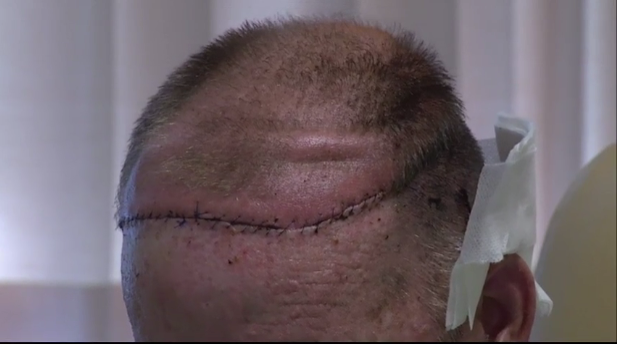Texas Man Receives World's First Skull And Scalp Transplant: Why It's Actually Impressive

A 55-year-old Texas software developer left a Houston hospital Thursday truly a new man. James Boysen received a new pancreas, kidney, and, for the first time in medical history, a new scalp and skull. Although the groundbreaking operation replaced the top of Boysen's head, severely damaged by cancer, he was most fortunate to find available organs in time to save his life.
A World-First
Radiation therapy used to treat Boysen’s cancer damaged a large part of his skull. Although in most individuals such a wound would heal on its own in time (since Boysen was already taking immunosuppressant medication due to a kidney and pancreas transplant he received over 20 years ago), his body was not prepared to deal with the damage. When his kidney and pancreas began to fail once again following his cancer treatment, doctors were presented with a dilemma: They could not perform a transplant operation while he had such a big open wound, but they also could not fix the wound while his organs were failing. The solution: replace everything at once.
Although the conclusion to do so was reached in 2011, it was not until recently that the actual operation was conducted. The surgery required a dozen doctors, 40 additional medical professionals, and lasted 15 hours. First, the team attempted the novel scalp and skull transplant by replacing his deteriorating wounds with a 10-by-10 skull graft and a 15-inch-wide piece of skin. Afterward, Boysen was fitted with a new pancreas and kidneys.
He left Houston Methodist hospital on Thursday with the new scalp already able to sweat at room temperature. To the shock of doctors, he even reported feeling a sensation in the new skin.
"That kind of shocked the doctor. He was doing a test yesterday and I said, 'Ouch! I feel that.' He kind of jumped back," Boysen said, The Associated Press reported.
The operation is just one of many recent cases that highlights just how fast transplant surgery is advancing. In the past year, an operation that was once considered impossible has evolved beyond doctors' imagination. Today, doctors have successfully transplanted hands, a face, windpipe, and even a penis and uterus.
Organ Availability In The US
Unfortunately, the availability of donor organs in the U.S. does not seem to be advancing as quickly as our ability to successfully fit them in patients. According to the Department of Health and Human Services, every day an average of 79 individuals are added to the organ waiting list. To put this into perspective, at this very moment there are currently enough people waiting to receive an organ to fill a large football stadium twice over. Unfortunately, there is a huge shortage of donated organs available, and as a result an average 21 individuals die every day waiting for transplants. A recent study revealed that even as the number of those on the waiting list continues to grow, the number of available donors in some regions of the U.S. remains the same.
Despite its high population, the percentage of registered organ donors in the U.S. is greatly dwarfed by other countries. Policy surrounding how one becomes an organ donor is partly to blame. In Spain, which has the highest organ donation rate in the world, there is an opt-out policy, meaning that citizens are automatically organ donors unless they opt-out. Israel, another country with a high percentage of organ donors, has another method of increasing its amount of available organs. Individuals who register as organ donors are given priority as a recipient over someone who isn’t a donor. Also, although in the U.S. HIV-positive donors are legally allowed to donate their organs to HIV-positive recipients, the practice has still not been instituted. Experts believe that doing so would help to free up the organ list and get more parts to the patients who desperately need them.
In Boysen’s case, it took 18 months for the organ-procurement organization LifeGift to find the right donor to provide all of the necessary organs.
"I'm glad the donor family had the generosity and insight to approve us doing this ... to get through their grief and approve the donation of this tissue besides the organs," said Dr. A. Osama Gaber, transplant chief at Houston Methodist, AP reported.
Published by Medicaldaily.com



























